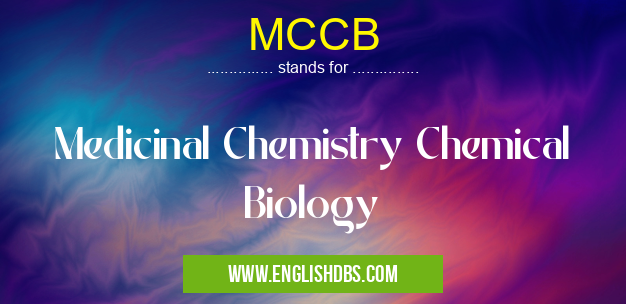What does MCCB mean in CHEMISTRY
MCCB is an abbreviation that stands for Medicinal Chemistry Chemical Biology. It is an interdisciplinary field that combines elements of chemistry, biology, and medicine to discover, develop, and validate new therapeutic agents for the treatment of various diseases. MCCB researchers utilize their expertise in organic chemistry, molecular biology, biochemistry, and pharmacology to design and synthesize small molecules that can modulate biological targets and produce desired therapeutic effects.

MCCB meaning in Chemistry in Academic & Science
MCCB mostly used in an acronym Chemistry in Category Academic & Science that means Medicinal Chemistry Chemical Biology
Shorthand: MCCB,
Full Form: Medicinal Chemistry Chemical Biology
For more information of "Medicinal Chemistry Chemical Biology", see the section below.
Subfields of MCCB
- Drug Design: MCCB involves the use of computational and experimental approaches to design and synthesize novel drug candidates with improved potency, selectivity, and pharmacokinetic properties.
- Target Identification and Validation: Researchers identify and validate specific biological targets (e.g., proteins, enzymes, receptors) that play a role in disease pathogenesis. This knowledge is used to design drugs that interact with these targets and inhibit or modulate their function.
- Chemical Biology: The use of small molecules to probe biological systems and uncover insights into cellular processes and disease mechanisms. Chemical biologists employ small molecules as chemical tools to interrogate biological systems and gain a deeper understanding of their molecular makeup and function.
- Translational Research: MCCB research is often translational, aiming to bridge the gap between basic science discoveries and clinical applications. Researchers work to develop new drugs and therapies that can be safely and effectively used in patients.
Essential Questions and Answers on Medicinal Chemistry Chemical Biology in "SCIENCE»CHEMISTRY"
What is Medicinal Chemistry Chemical Biology (MCCB)?
Medicinal Chemistry Chemical Biology (MCCB) is an interdisciplinary field that combines principles from medicinal chemistry, organic chemistry, and molecular biology to study the interactions between small molecules and biological systems. MCCB focuses on the design, synthesis, and evaluation of new drugs, as well as the development of chemical tools to probe and modulate biological processes.
What are the goals of MCCB?
The goals of MCCB are to:
- Identify and validate novel targets for drug discovery
- Design and synthesize new drugs with improved efficacy and safety
- Develop chemical tools to study biological processes
- Understand the mechanisms of action of drugs and small molecules in biological systems
What are the applications of MCCB?
MCCB has applications in a wide range of areas, including:
- Drug discovery and development
- Chemical biology
- Systems biology
- Translational medicine
- Precision medicine
What are the educational requirements for a career in MCCB?
A career in MCCB typically requires a PhD in chemistry, medicinal chemistry, or a related field. Postdoctoral training is also common.
What are the career opportunities in MCCB?
MCCB graduates can pursue careers in academia, industry, or government. Common job titles include:
- Medicinal chemist
- Chemical biologist
- Drug discovery scientist
- Research scientist
Final Words: MCCB is a rapidly growing field that has led to the discovery of numerous important drugs for the treatment of various diseases. By combining the principles of chemistry, biology, and medicine, MCCB researchers contribute to the advancement of healthcare and the development of new therapeutic strategies to combat human diseases.
MCCB also stands for: |
|
| All stands for MCCB |
